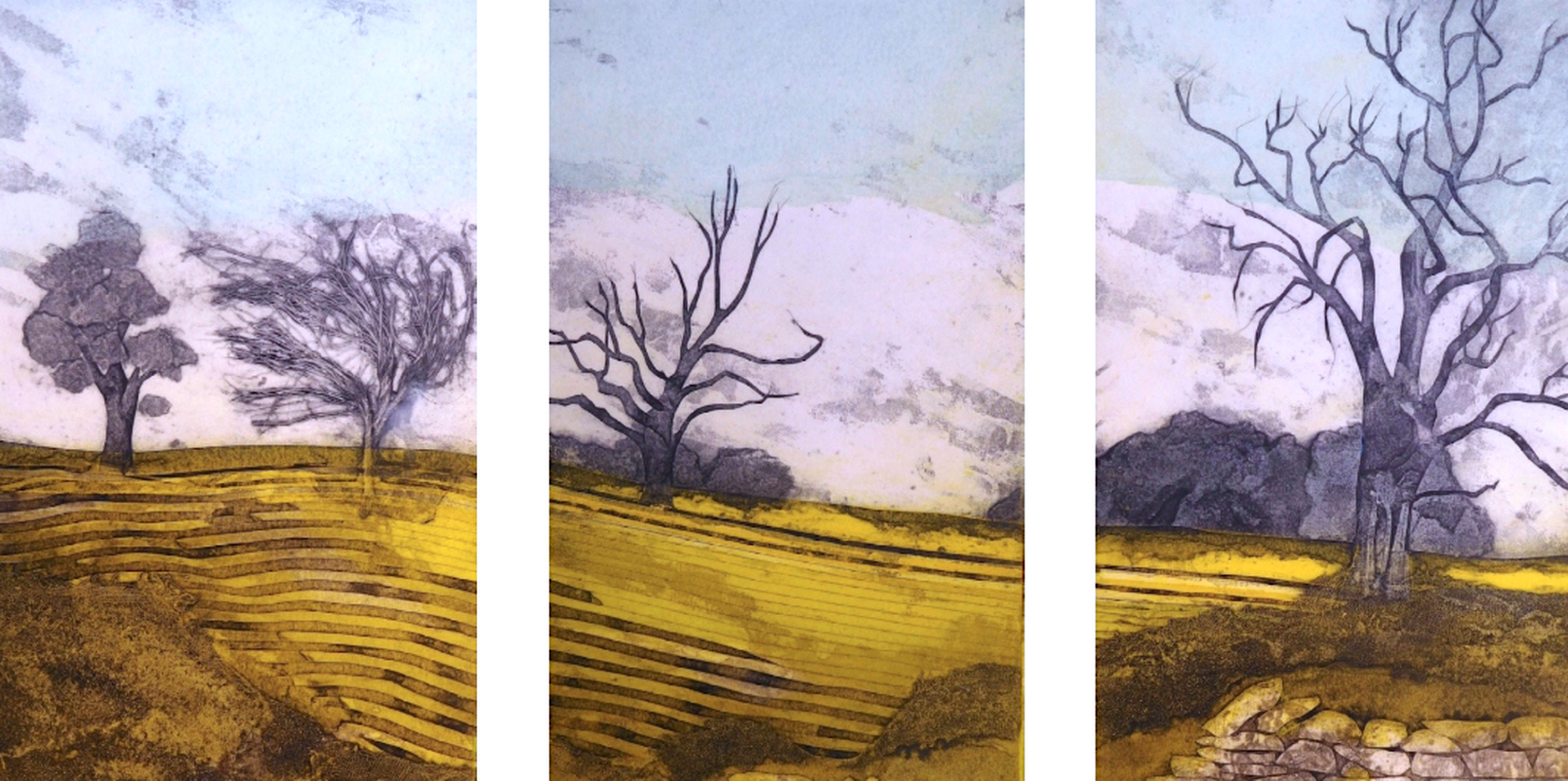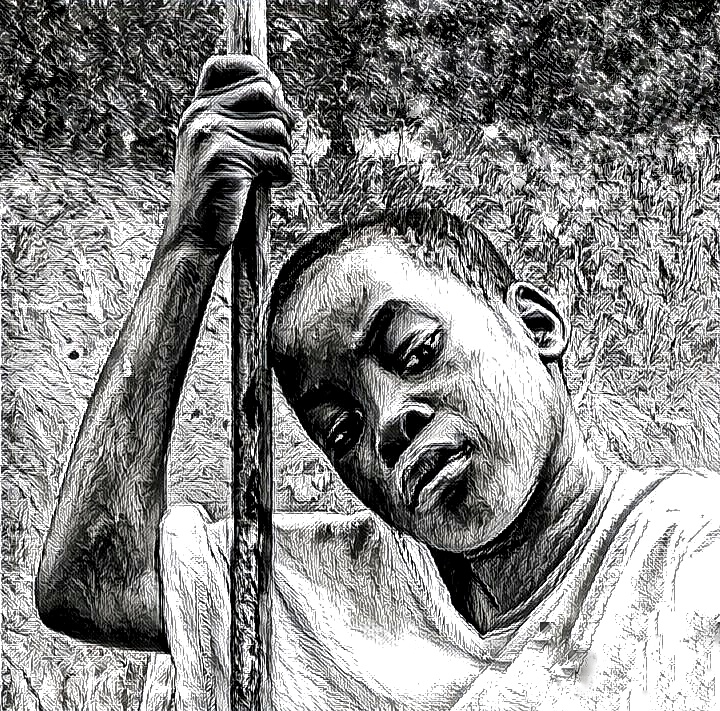
SARAH ROSS-THOMPSON AND THE ART OF COLLAGRAPHED PRINTS
I interviewed artist Sarah Ross-Thompson whose exceptional Collagraphed prints use fabrics, lichen, porridge and string to create images of the dramatic Scottish Highlands where she


I interviewed Martins Deep (he/him), an Urhobo poet based in Zaria, Nigeria. He is a photographer, digital artist, & currently an undergraduate student of Ahmadu Bello University, Zaria. He is a Pushcart Prize nominee and a Best of the Net finalist, ’22. His works have appeared or forthcoming in Magma Poetry, Strange Horizons, Lolwe, Augur Magazine, Fantasy Magazine Josephine Quarterly, Anathema Magazine and elsewhere. He says hi @martinsdeep1
Leslie: How do you prepare (both consciously and instinctively) for a poem? If you feel a poem coming, how do you help it on its way?
Martins: I think that ideas for poems always finds me unprepared, with the exception of instances when I’m intentionally writing to beat a deadline. There are times I wouldn’t even be capable of entertaining any, but for the fact that I consider most generally striking, I let myself go with the flow. But anytime I’m ready, I could sense the kind of creative energy that would be best for poetry or digital art. This is more of weighing what I feel up to being spent on— my mind collaborating with my hands and eyes. If it’s for poetry, my mind chooses between silence or noise to aid its birth. The preparation is really just a mental positioning exercise to help gather the ideas that are swirling around and piece them all together, later. It’s interesting to know that I’ve somehow developed into a spontaneous animal, because my creative process is barely predictable.
My poetic inspiration usually comes in the form of fleeting images, the echoing of phrases and other disjointed statements that grab my attention. The pictorial equivalent of this process is a mother giving birth to a baby, but in various body parts. Then, the doctor assembles them into a whole.

Leslie: Can you tell us, please, how you find original expressions when you’re writing/editing? What are the main revisions you undertake?
Martins: Honestly, having being greatly influenced by different writers whose writings I have binged on at various points throughout my creative journey, one can become attached to their modes of expression. I suppose it comes with the admiration. However, I sift through the internal clutter for a style that is imprinted with my voice. This is for someone who wishes to do things differently. Every expression that my mind suggests goes through a filter that I trust to keep things genuine, true to who I am, and what I want to do. These words appear to carry a scent of some kind anyone who has read me over time may easily recognize as being mine. I fondly think of it as an act of embracing or letting go, for the purpose of keeping it real.
My revisions usually consist of going through a jumble of imageries, themes, literary devices, expressions, structure, style, language, et cetera. After I’ve finished cherry-picking, another process that modifies the poem to let me enter it in a special way begins. This process may take several days or a few hours, but one thing I am certain of is that it improves my ability to relate to the poem. Additionally, I perceive things differently than I would have at the earlier stage of creation.
Leslie: How has your childhood experience, your family/community and where you live now influenced your poetry?
Martins: What you just mentioned has had the most influence on my art, in my opinion. Speaking of my childhood, I feel a strong connection to that period of my life. Being the nostalgiac that I am, my work frequently references to my childhood experiences, or how it feels to be a child. The most enjoyable moment I take into account when writing is the way they cause me to view the world through the lens of wonder. In some way, my compositions contain memories of my relationship with my late father, going out with friends to swim in a river, my adventure in bushes, school, and church. I simply can’t help myself, especially considering the light they bring to the present. Even with the ills in the very heart of my experiences as a creative, nothing makes me feel more gratified.

I believe that the impacts of my surroundings, family, and community are still as strong, relevant, inspiring, and as inexhaustible as my childhood experiences. The present that I’m in at the moment continues to mould me and bleed into my writing in remarkable ways.
Leslie: In view of your approach to writing poems, how do you go about creating artworks? How similar/different are the two creative disciplines for you?
Martins: As I previously stated, it’s crucial to know what to do with the creative force that plugs me into another realm. When my discernment fails, I struggle. This means that, while I occasionally have inspiration for a piece of art, the energy just isn’t right for a poem when I don’t feel up to holding a stylus pen for several hours. For artworks, it’s about visual narrative using hues, tones, lighting, brushes, and an expression that is uniquely mine. The earliest stage of creating an artwork is the visualization that appears in flashes. And since I feel the view in my mind’s eye is much different from what I paint, I like to refer to my final paintings merely as attempts.
Poetry and painting, in my opinion, both involve storytelling and artistic expression. This gives rise to the various pathways that distinguish one from the other. They differ in the manner in which they are expressed: visual or textual, or even both. But when I write, it feels like I’m painting. I think my poetry is imagistic because of this. These days when I paint, I visualize a line from one of my poems. I remember sending a poem to a literary journal, and when it was rejected, I painted the poem’s key imagery, sent it to the same journal, and it was accepted for the issue’s cover. It felt so good!

Leslie: Which three people have influenced you the most? Why them?
Martins: There are so many people who have influenced me, starting with my first exposure to poetry and continuing to the present, among which includes; Wole Soyinka for his masterful diction, my late father for his ability to play various roles between truth and fiction, and Abubakar Sadiq, who I consider to be a miracle because of his cutting-edge speculative poetry.
Leslie: What characterises you as a poet of Africa and a poet of the world?
Martins: Simply said, my racial identity, or the colour of my skin, as well as my environment and culture from which I draw the main inspiration for my creative works, are basically what defines me as an African poet.
Being a poet of the world shouts borderless, human, transcendental. This is true because boundaries become fluid, or even inexistent, at the touch of a sigh on paper or canvas, evoking a sense of freedom that transcends geography and race.
Next week I interview Marilyn and Howard Timms who run the innovative poetry organisations Frosted Fire & Wildfire Words and are life patrons and active supporters of Cheltenham Poetry Festival.
ABOUT LESLIE TATE’S BOOKS:

I interviewed artist Sarah Ross-Thompson whose exceptional Collagraphed prints use fabrics, lichen, porridge and string to create images of the dramatic Scottish Highlands where she

Part 2 of my interview with Mark Statman looks closely at Mark’s Latin American poetic influences, his life in Mexico and ends with an extract

I interviewed international poet and translator Mark Statman about Volverse/Volver, his 14th published collection. Mark, who has won national arts awards, is Emeritus Professor of Literary

I interviewed Lisa Dart, finalist in the Grolier, Aesthetica and Troubadour Poetry Prizes and author of The Linguistics of Light (poems, Salt, 2008), Fathom (prose

I interviewed writer Julia Lee Barclay-Morton about her experience of autism. Julia began as an experimental dramatist in New York, moving to the UK to
| Cookie | Duration | Description |
|---|---|---|
| cookielawinfo-checkbox-analytics | 11 months | This cookie is set by GDPR Cookie Consent plugin. The cookie is used to store the user consent for the cookies in the category "Analytics". |
| cookielawinfo-checkbox-functional | 11 months | The cookie is set by GDPR cookie consent to record the user consent for the cookies in the category "Functional". |
| cookielawinfo-checkbox-necessary | 11 months | This cookie is set by GDPR Cookie Consent plugin. The cookies is used to store the user consent for the cookies in the category "Necessary". |
| cookielawinfo-checkbox-others | 11 months | This cookie is set by GDPR Cookie Consent plugin. The cookie is used to store the user consent for the cookies in the category "Other. |
| cookielawinfo-checkbox-performance | 11 months | This cookie is set by GDPR Cookie Consent plugin. The cookie is used to store the user consent for the cookies in the category "Performance". |
| viewed_cookie_policy | 11 months | The cookie is set by the GDPR Cookie Consent plugin and is used to store whether or not user has consented to the use of cookies. It does not store any personal data. |